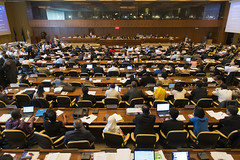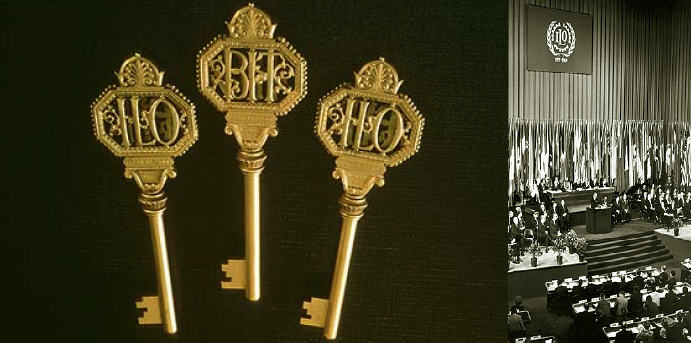- Key documents
Guy Ryder, ILO Director-General (2012-)
 “
If there aren't jobs, there can be no sustainable economic growth. If the economy can't grow, it can't create jobs. That simple logic wasn't apparent to policy-makers who applied austerity in Europe. It's not the only element of the economic malaise we face, but it's the quintessential centre of it all.
” |
- Biography of Guy Ryder
Juan Somavia, ILO Director-General (1999-2012).
 “There
shall be a Director-General of the International Labour Office, who shall
be appointed by the Governing Body, and, subject to the instructions of
the Governing Body, shall be responsible for the efficient conduct of the
International Labour Office and for such other duties as may be assigned
to him. The Director-General or his deputy shall attend all meetings of
the Governing Body.” (article 8 of the ILO Constitution) |
- Biography of Juan Somavia
Inception of the
Decent Work Agenda
“The primary goal of the ILO today is to
promote opportunities for women and men to obtain decent and productive
work, in conditions of freedom, equity, security and human dignity” (Juan
Somavia, ILO Director-General).
Initiated in 1999 by ILO Director-General Juan Somavia, the
Decent Work Agenda promotes a development strategy that recognizes the
central role of work in everyone′s life. The Organization provides support in
the form of integrated decent work programmes developed at country level
with ILO′s constituents. These programmes set priorities and targets within
national development frameworks and aim to tackle major decent work
shortcomings through effective programmes that meet each of ILO′s four strategic objectives:
- to promote and implement the standards
and fundamental principles and rights at work;
- to enhance the opportunities for men
and women to obtain decent employment and wages;
- to expand the scope and heighten the
effectiveness of social protection for all;
- to strengthen tripartism and social
dialogue.
In his
report to the 87 th Session of the International Labour
Conference, the Director-General recalled the issues inherent in the
concept of decent work: “The ILO is concerned with decent work. The goal is
not just the creation of jobs, but the creation of jobs of acceptable
quality. The quantity of employment cannot be divorced from its quality.
All societies have a notion of decent work, but the quality of employment
can mean many things. It could relate to different forms of work, and also
to different conditions of work, as well as feelings of value and
satisfaction. The need today is to devise social and economic systems which
ensure basic security and employment while remaining capable of adaptation
to rapidly changing circumstances in a highly competitive global market.”
On 10 June 2008, at its 97 th Session, the International Labour
Conference adopted the ILO
Declaration on Social Justice for a Fair Globalization, which is to be
implemented in the context of the Decent Work Agenda and its four strategic
objectives.
Worst Forms of Child
Labour Convention, 1999 (No. 182)
“This
fundamental convention defines as a ‘child′ a person under 18 years of age.
It requires ratifying states to eliminate the worst forms of child labour,
including all forms of slavery or practices similar to slavery […] The
convention requires ratifying states to provide the necessary and
appropriate direct assistance for the removal of children from the worst
forms of child labour and for their rehabilitation and social integration.
It also requires states to ensure access to free basic education and,
wherever possible and appropriate, vocational training for children removed
from the worst forms of child labour” (see Rules of the game: A brief introduction to International Labour Standards, p.
30).
In June 1994, at the 81 st session of the International Labour
Conference, a clear consensus emerged among ILO′s constituents to step up
promotion of fundamental social rights. The World
Summit for Social Development, held in Copenhagen in March 1995, bolstered ILO′s
efforts by inviting the governments to protect and promote “respect for the
fundamental rights of workers”. It was in this favourable international
context that ILO defined as “fundamental” the conventions dealing with
matters considered to be fundamental principles and rights at work. On 25
May 1995, ILO Director-General Michel Hansenne,
sent a letter to the Member States with a view to obtaining
universal ratification of these fundamental conventions, of which there
were seven at the time. The ILO Declaration on Fundamental Principles and Rights at Work (1998), a
promotional instrument drawn up specifically to strengthen application of
the fundamental legal principles for social justice, gave a substantial
boost to the ratification campaign.
In 2008, ILO Director-General Juan Somavia drew attention to the importance of accelerated ratification of
the fundamental conventions and proposed the goal of universal ratification
by 2015. (See Ratification and promotion of fundamental ILO conventions, p. 1)
There are currently eight fundamental conventions:
- Forced Labour Convention, 1930 (No. 29)
- Freedom of Association and Protection of the Right to Organize Convention, 1948 (No. 87)
- Right to Organize and Collective Bargaining Convention, 1949 (No. 98)
- Equal Remuneration Convention, 1951 (No. 100)
- Abolition of Forced Labour Convention, 1957 (No. 105)
- Discrimination (Employment and Occupation) Convention, 1958 (No. 111)
- Minimum Age Convention, 1973 (No. 138)
- Worst Forms of Child Labour Convention, 1999 (No. 182)
Reorganization of ILO′s external structures
In
1999, at the behest of the International Labour Conference′s Committee on
Technical Cooperation, ILO reorganized its external structures with a view
to the coherent and effective implementation of its programme. In that
context, decent work teams were established in the regions in order to
strengthen the regional offices′ strategic function to define the decent
work programme of activities.
Since 1 April 2003, the date on which the reform took effect, the network
of ILO external offices consists of a three-tier structure made up of:
5 Regional Offices
The regional offices have overall administrative and policy responsibility
to promote ILO′s objectives and coordinate implementation of decent work
policies and programmes at regional level, in particular by cooperating
with regional bodies.
- ILO Regional Office for Africa
- ILO
Regional Office for Latin America and the Caribbean
- ILO
Regional Office for the Arab States
- ILO
Regional Office for Asia and the Pacific
- ILO
Regional Office for Europe and Central Asia
15 Subregional Offices
- The subregional offices represent ILO
in the countries under their direct responsibility and are in charge
of planning and implementing ILO programmes and of evaluating ILO
activities in all the subregion′s countries. Three subregional offices
(Bangkok, Lima and Addis Ababa) are in the same premises as the corresponding regional offices.
- The area offices that merged with multidisciplinary
teams became ILO subregional offices (in the case, for example, of the
Subregional Office for Central Africa, SRO-Abidjan). The independent multidisciplinary teams also became
subregional offices (for example, the Subregional Office for Southern Africa, SRO-Harare).
29 Offices
- ILO offices represent the Organization
in the countries for which they have a remit and are in touch with the
constituents. Depending on the case, they provide administrative and
logistical support to the subregional office′s efforts to implement
programmes and projects in the country concerned.
- The area offices that did not merge
with multidisciplinary teams became ILO offices (for example, the ILO
Offices for Burundi, Congo, the Democratic Republic of the Congo and Rwanda).
The branch offices and liaison offices also become ILO offices (for
example, the ILO Office in Germany, ILO-Bonn).
- The ILO Office in New York liaises with the United Nations.
- The ILO Office in Washington, DC, liaises with the international financial institutions.
|
 |
 |
 |
 |
















